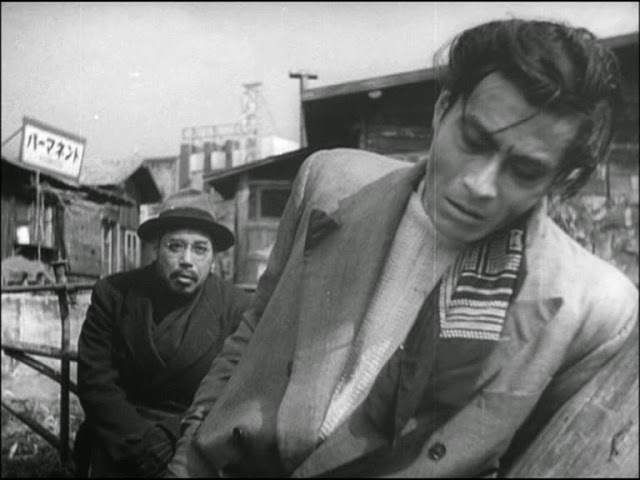Drunken Angel (1948)
Akira Kurosawa's "Drunken Angel"
In beginning my new venture into the work of Akira Kurosawa, my first film from his select filmography is perhaps his first major work. The film is considered by many to be a 'noir,' which would not be a consistent style in Kurosawa's work. However, "Drunken Angel" does offer an insightful ignition point into the work of a director and into the psyche of post-war Japan.
"Drunken Angel" tells the story of an alcoholic doctor who becomes invested in a yakuza member after a devastating diagnosis. Despite coming to the doctor for a gunshot wound, the doctor uncovers a spot on the lung of the yakuza member, Matsunaga. The doctor, Sanada, wishes to treat Matsunaga, despite Matsunaga's stubbornness. In order to get better, Matsunaga must give up his drinking and smoking. This is turn means he must also give up the yakuza profession he's made for himself and the dangerous and degrading lifestyle. Throughout the film, in typical noir fashion, Matsunaga begins to learn how the yakuza are using him and running him into the ground. After a final gunfight with one of the head members, Matsunaga dies.
The reason the film is labeled a noir is due to the protagonists' ultimate uncovering of the mechanisms which keep him down. The yakuza have placed Matsunaga in a village which surrounds a toxic pool emitting poisonous fumes. On top of this, they've only used him as a ragdoll for their own evil intentions. This thematic element of the film becomes analogous to post-war Japanese sentiment. The people everyone has placed their trust in has only used them to further their agenda and run their own people into the ground because of it. Kurosawa seems to be using the film to reconcile with this resentment of the Japanese people in their government. This noir film marks the ignition point of this recognition that the people are being used and misled and that the people they've placed their faith in don't actually have their best interest. In fact, their actively killing them.
As an antidote to this misplaced loyalty and the act of slowly dying away from the poisonous position the state has put these people in, Kurosawa's film offers a light to this growing darkness in the form of the drunken doctor. Despite the stubbornness from others, the doctor selflessly continues to try and help the people around him. A wise elder trying to help the youth recover their dignity and drive. The antidote to this melancholy and depression for the Japanese people are caring and compassionate citizens who aim to better their society and better the people around them.
"Drunken Angel" marks the first radical ignition point for an illustrious career and starts Kurosawa on a path of recognition. This film stands in for this recognition that a post-war Japan is now a reality, full of darkness and despair. Despite offering hope, the film still ends tragically. The first embarkment of my Kurosawa journey begins with acknowledgement. Acknowledgement of the state of Japan, the state of post-war Eastern society, and the state of Kurosawa himself.




Comments
Post a Comment